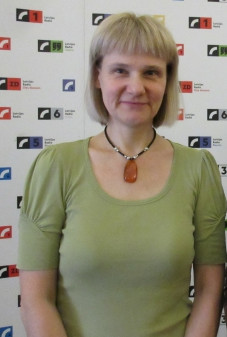
Dzintra Kurme-Gedroica
(06.11.1968 )
"When I compose, I try to compose so that, firstly, I myself enjoy what I have written. After that I hope that perhaps someone else will enjoy my work. And still, in my opinion, God has given music to people not just for the sake of enjoyment. Ideally, music should give one the desire to direct their sad eyes towards the heavens. Music is a road – one of the roads to self-fulfillment and development – a road to God, a road to oneself... It is for the author, for the performer, and for the listener."
Dzintra Kurme-Gedroica
Dzintra Kurme-Gedroica (born Kurme, married name Gedroica) was born on the 6th of November, 1968 in Riga. Her love for music came from her family: her father’s father Ādams Kurmis was a musician who played in the countryside. He was a player and manufacturer of folk instruments, and he passed on his playing skill to his son, the composer’s future father Zigmunds Kurmis. Her mother, Lidija Kurme (born Vanaga), who in her youth was a well-known singer and a participant in the Melngailis Choir, also aided her appreciation of music. Dz. Kurme-Gedroica studied in the Jāzeps Mediņš Music School piano class with Velta Lūkina. From 1981 to 1984, she also studied composition with Maija Einfelde as an elective. From 1984 to 1988 she studied in the theory department at the Jāzeps Mediņš College of Music, where she learned composition with Tamāra Kalna. In 1988, she entered the Latvian State Conservatory, studying composition with Ādolfs Skulte, and graduated in 1992. She also worked as a teacher at the Jāzeps Mediņš College of Music from 1991 to 1992. Since 1992, Dz. Kurme-Gedroica has been working in the sheet music department at the Latvian Academy of Music’s library, and since 1998 has been the director of this division.
The composer’s characteristically enriched and expressive harmonic colors and broad use of ostinato principles often leave the impression of magic incantation. Her music has been included in the repertoire of many interpreters of the new generation. An especially popular selection is the organ work Uguns vēsts (The Fire Message), which has been performed by Aija Ziņģīte, Ligita Sneibe, and Aigars Reinis. Her Variations for Piano has been played by Juris Žvikovs, compositions for clarinet have been played by Guntars Gedroics, and solo songs sung by Māra Krauja-Reine and Antra Bigača. LITERATURE I. Liepiņa, Doma ērģelēs dzīros sikspārņi (Bats Revel in the Dome Cathedral Organ)/ / Neatkarīgā Rīta Avīze, June 19th, 2003
Baiba Jaunslaviete Photo - Edmunds Mickus © LMIC
